Lockdowns, shootings, prostitution. How a school fought a 'crime magnet' motel and won
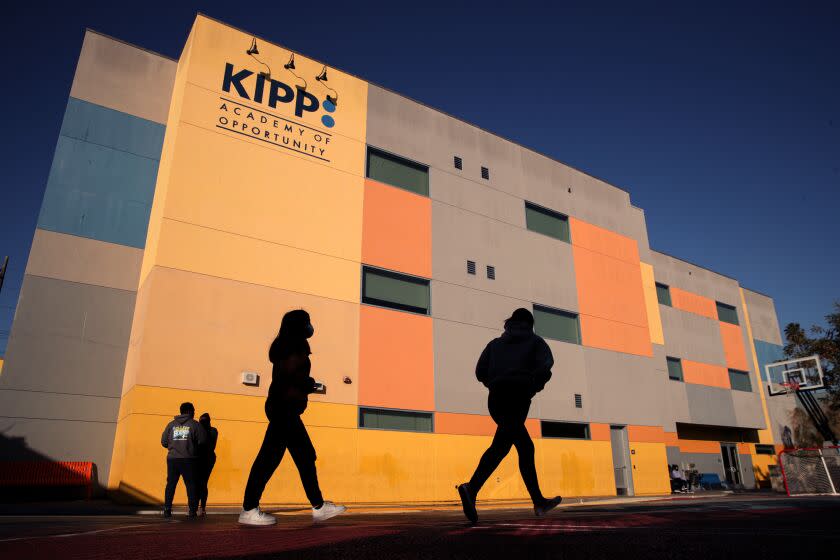
The September 2021 shooting at the "crime magnet" motel flanked by two schools crystallized the urgent mission at hand for the campus community.
A police officer had shot and wounded a motel occupant, and the investigation forced a last-minute, all-day shutdown of KIPP Academy of Opportunity, a middle school. Staff members scrambled to notify parents and to create a holding area for students, who were already arriving on foot and by car.
"I got a call early morning that there was a police-involved shooting at the motel," said Principal John Coleman III. "I can't open my school. I can't even come anywhere near my school."
Some parents could no longer take it — the screaming sirens, the hovering police helicopters, rampant prostitution, drug dealing around campus. The shooting led to a spike in exits from the well-regarded KIPP organization, which more typically deals with waiting lists rather than departures.
The middle school, with a capacity of 490, was down to 369 students, threatening its future. Somehow, some way, either the motel had to be cleaned up — or it had to go.
Best, worst place for a school
So many aspects of that stretch of Figueroa Street, north of Manchester Avenue, seem incongruous for a school. It backs up against the 110 Freeway — an offramp curls around the campus. Crushing traffic passes all day on Figueroa, a major thoroughfare. There's too little parking for staff, no room for a grassy playground or sports fields. And right in the middle stood the Palms Motel.
But surrounding the 8400 block, working-class families live, raise children and work for better lives — the sort of urban setting where KIPP SoCal has located 19 campuses, part of a national network of 242 schools.
KIPP Empower Academy, the elementary school, opened at the site in 2014, just north of the motel on land that formerly housed a towing company. The middle school moved in south of the motel in 2017, where there had been a church. KIPP's colorful cube-like structures rose on each side of the motel. KIPP had wanted to buy the motel property, but the owners weren't interested.
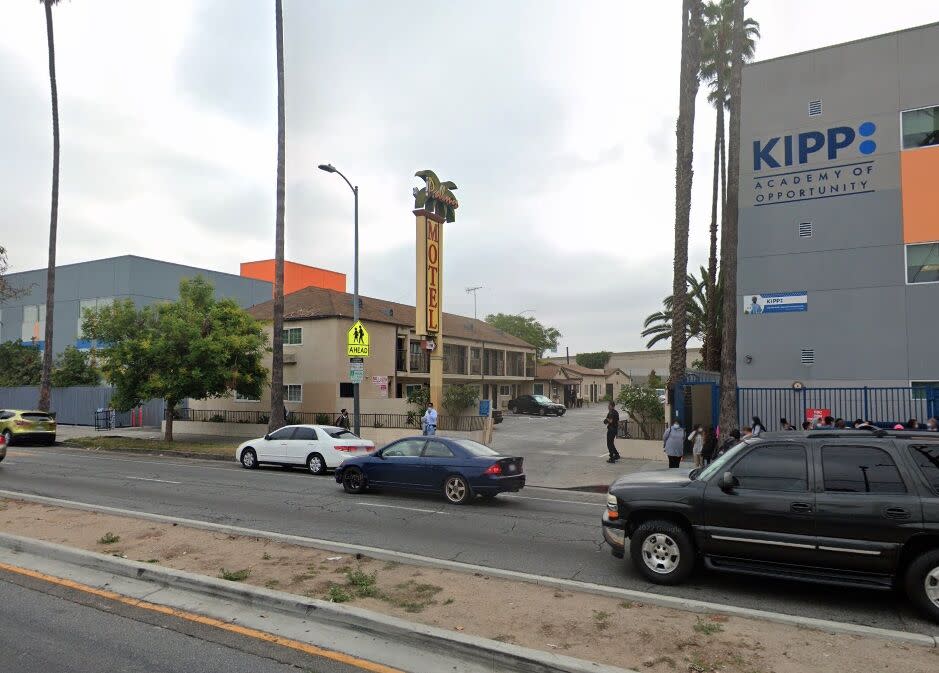
Troubles began right away. In 2017, gunfire after school left a passerby wounded as bullets struck the school's main pedestrian gate, leaving shell casings scattered on the ground.
In the wake of the COVID-19 pandemic, issues intensified, said LAPD Senior Lead Officer Ruben Cardenas. "We would have problems just about every day regarding prostitution, gangs, narcotics activity — within and outside the motel. ... And we have these kids going to and from school."
The scenes made an impression on fourth-grader Giahnii Brooks.
"I used to see the girls and they were like half-naked and getting in people's car and stuff," said Giahnii, 9. "My grandma told me that it was girls selling their bodies for money — because they didn't have any other way."
And with police calls came lockdowns — sometimes two or three a week.
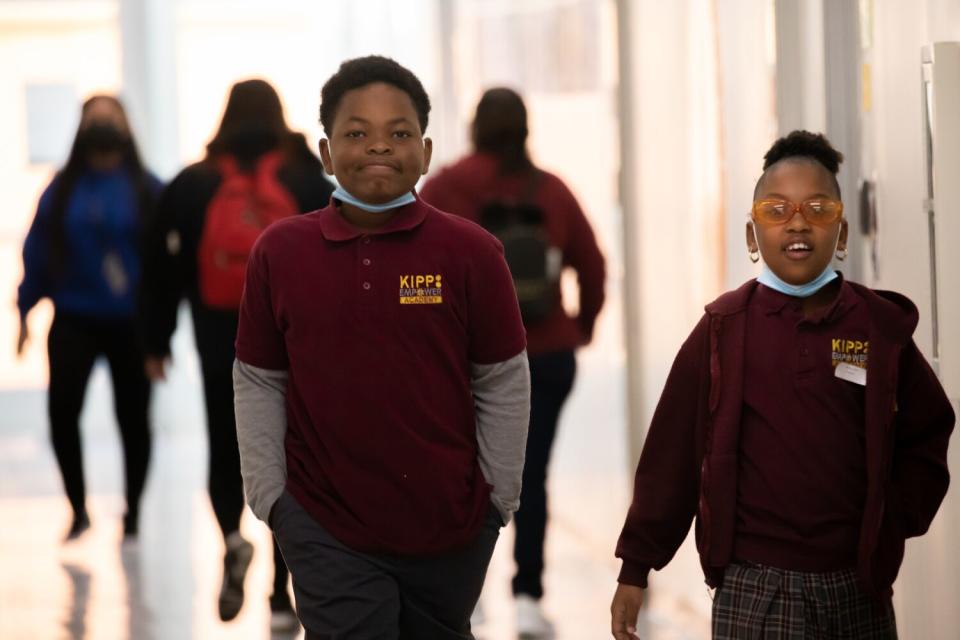
In a lockdown, said Giahnii, "the teachers will turn off the lights. They will put like any type of paper on the window that's on the door and then they will have to tell us to be quiet. So no one tries to come in and thinks that people are here."
Palms Motel owner Maoson Young said the school unfairly blamed the motel for pervasive crime that police seemed unable to control. He had owned the two-story, 21-unit motel for about 10 years — and it had been in operation for at least 40 years.
"Everyone wants to blame the hotel owner," said Young, who has managed hotels in Los Angeles since the 1970s. "The problem is crime in the community."
Young said his clerks and managers would call police at signs of trouble, but it frequently took officers hours to arrive. By then the person brandishing a weapon was gone. And officers advised him they couldn't harass an occupant because of multiple visitors — where was the proof of prostitution? Young said he hired 24-hour on-call security.
After the 2021 shooting, parents and school leaders signed petitions, rallied local support from other groups, connected with political leaders, demonstrated at City Hall and alerted the media.
"Over several months, we met with a team composed of two deputy city attorneys, a vice detective and a lead officer to report all safety incidents stemming from the motel," said Joanna Belcher, KIPP SoCal's chief external impact officer.
And, starting in early 2022, the reports came in regularly: A person at the motel taking video of students; an argument that ended with a driver backing his car into a pedestrian and pinning him against a pole; a man using drugs openly and exposing himself to women who then got into a fight with three others; a baggie with "a large amount of a white substance" left in a planter; a wine bottle tossed from the motel property that shattered next to a line of children.
Parents brought their concerns to city officials.
"I’m a mother to a 6-year-old child that attends KIPP Empower Academy," wrote Diana Ramos. "My child began crying when I picked him up from school today because he was so scared during the lockdown and wanted to come home but couldn’t. It’s time for the neighborhood to change."
"I'm signing this petition because as a current student," wrote Arianna Rodriguez, "I shouldn't have to see people running/walking to the motel naked."
KIPP and motel management entered mediation nearly a year ago. Young said he made a good-faith effort. Police confirmed that the motel put in more outdoor lighting and installed signs warning that parking was for residents only and that other vehicles would be impounded.
Neither the promised camera system was installed, nor a higher perimeter fence, said Officer Cardenas. That was needed because motel occupants threw items from the second story into the play garden: bottles, syringes, condoms. The school erected a 20-foot chain-link fence with green screening as a barrier.
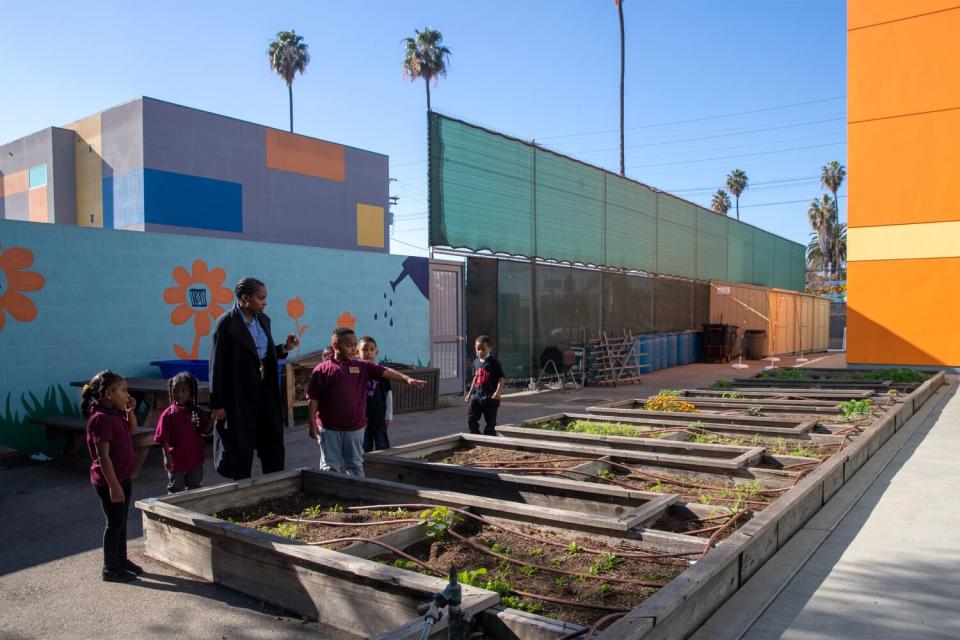
Things were moving too slowly for dance teacher La Tasha Poster-Holbert, who quit in June after six years with KIPP.
"In my time span I met some amazing people and developed some profound relationships," she said in a departure letter she allowed the school to make public. But "the area had a stench. ... It was very oppressive and on a daily basis I had to pray and listen to positive messages just to teach."
City Councilman Marqueece Harris-Dawson, who represents the area, said he remembers the motel from the 1990s, before he ran for office, as a leader of a community group that put the property on its list of "crime magnets" — "properties where if you drew a circle around it, you could correlate the violent crime calls to that location."
He pledged to help with a nuisance-abatement process that could eventually lead to a forced sale.
A deal is struck
KIPP officials were frustrated by a lengthy bureaucratic endeavor with no guarantee of success.
But the pressure was weighing on the motel owners. Young said he felt as though the city was against him. He and his partner were ready to negotiate.
Could KIPP afford to buy the motel? KIPP SoCal's revenue for 2020-21 was $140 million, but those funds were designated for education services and existing liabilities.
But how could they afford not to?
The parties met somewhere in the middle, agreeing on a purchase price of $4.7 million. The money came from reserves, according to KIPP, which also receives philanthropic support aside from the funding public schools receive.
Escrow closed Sept. 9. Demolition of Palms Motel began on Oct. 28.
Where once stood the Palms Motel lies a neat, quiet parking lot.
Young has moved on; he owns other hotels and is active in a local motel association. But he warned that the prostitution and other crime won't disappear with the motel.
On a recent weekday morning, sex workers were pacing within blocks of the campus.
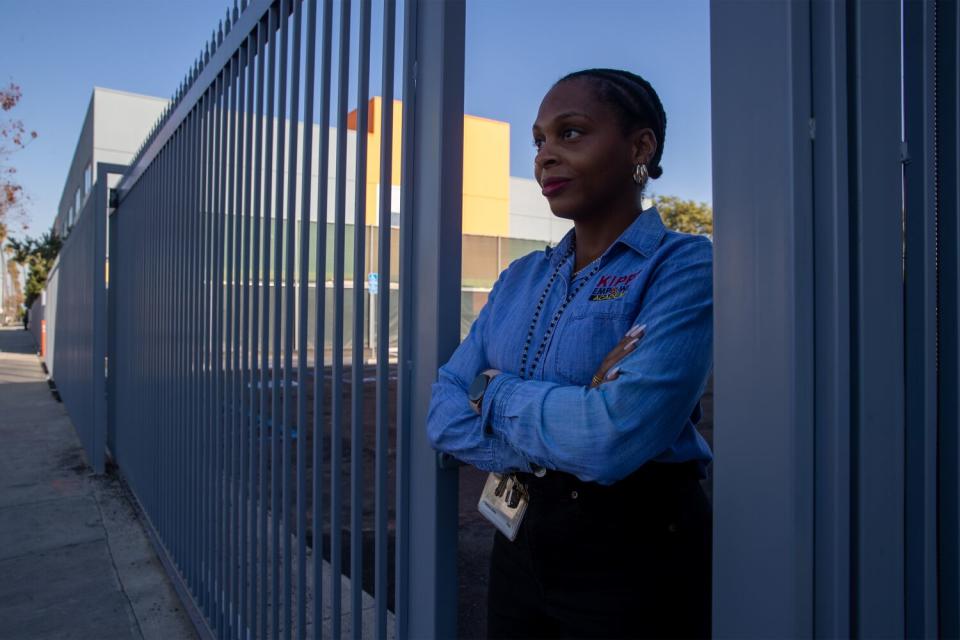
Officer Cardenas called the outcome a highlight of his career: "When we first started this process, I was a little skeptical as far as: Can it be done? I'm glad I was proven wrong because they did it: The community, the parents, teachers — they all got together and they made it happen."
Principal Coleman said the new parking lot is much needed, but why stop there? Why not raise more money, dream bigger.
"I'm definitely thinking of underground parking and then of having a gym, a dance studio, recording studio and offices on the second floor and a third-floor turf field — so that we can get engaged people into our school, even those that don't necessarily have kids here. We've got to invest in the community."
This story originally appeared in Los Angeles Times.

